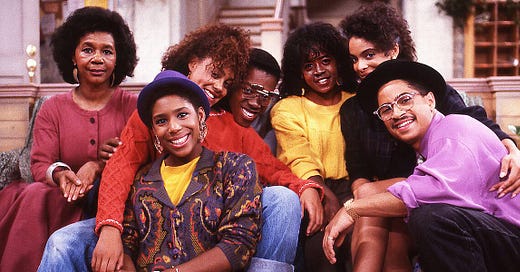ANEW: In Front of a Live Studio Audience
From NEC to NBC: Catching a Break on "A Different World"

A car had been sent for me that whisked me away from the Beverly Garland Hotel, not too far from the Universal Studios lot. Nothing fancy — some cream-colored Oldsmobile, maybe — but I was soaking up every moment. Being utterly alone in a strange city was new to me. I’d come to know Chicago, at least in the way actors know a city—its stages, corner cafés, the cheap takeout spots where scripts get memorized. Besides, it was my hometown. New York, too, had a kind of known chaos. Big lights do inspire you! But LA? LA was a different beast. It made my eyes itch and my throat tighten. The smog, I assumed.
“You’re in Dressing Room #3, right outside the soundstage. Cassidy from wardrobe will be by to make sure what you brought from home works with what we’ve got. And, oh yeah—break a leg. You’ll be great.”
I nodded like it was no big thing, but my stomach was in revolt. I'd filmed commercials, a soap opera in Manhattan, and indie scenes on location before, but this? This was primetime. Network. And it was in front of a live studio audience. That excited me — live meant energy, instinct — but the stakes felt higher than anything I’d done before.
My trailer smelled faintly of sewage. Not ideal. I thought about saying something, but decided against it. They were flying me out from New York for two episodes. I wasn’t trying to make waves. Besides, the character I was playing—confident, smooth, charming — was miles from the guy I felt like at the time. I’d just ended an engagement. I was trying to hold myself together. But the beauty of acting is stepping into someone else — especially someone bolder than you’ve ever dared to be.
Outside the dorm room set, there were yoga mats laid out. Odd, I thought. Then Debbie, the director, arrived.
“Okay, everybody, let’s go. Stretch in ten. Time to get your funky on,” she announced, full of theater-kid command.
It was nothing like what I’d imagined. Debbie ran us through a series of stretches, warm-ups—it could have been straight out of Fame. The cast moved like a company. No egos, just rhythm.
I noticed two of the regulars vibing with each other — playful. The woman cast to play my girlfriend asked about my work.
“I heard you did a play at NEC. I’ve always wanted to work there.”
She knew. She had done her research. No one had ever brought up the Negro Ensemble Company in casual conversation before. It startled me.
“I did. Where’ve you worked?”
“I was in Sarafina! That’s how Debbie found me.”
I nodded. I’d never been found. It seemed off-the-chain good.
The rest of the week fell into a rhythm — table reads, rewrites, the daily script pages slipped under my door at the Beverly Garland. I hardly left my room. LA didn’t tempt me. I was locked in.
Rehearsals felt real. We’d find little moments to shape. Writers, planted in the back row, laughed loudly to cue us where the funny was.
Scene—
“Boy, where are your draws?”
“Ah-ha-ha-ha-ha!” All the way in the back.
And then came taping night.
After craft services had cleared and the cameras were set, I slipped into my ritual. Shadowboxed in the mirror like Jake LaMotta. Or, I should say, De Niro doing Jake LaMotta.
“You’re the boss, you’re the boss, you’re the boss,” I rasped at myself in the dressing room’s mirror. Bobbing, weaving, psyching myself up. I didn’t stretch—maybe I should’ve—but I was loose in my own way.




By now, I felt at home on set. I started playing with the lines. The actor’s version of jazz—riffing, listening, responding. I liked Charnelle. She played my girlfriend with such ease. There was something kind about her, about her curiosity. Dawn, on the other hand, reminded me of every girl I knew growing up.
“Brian’s got a high booty, don’t he? All the way up to the back of his neck.”
I even cracked up at that one. It was true.
The magic was in the routine. In the way Debbie layered lightness into the blocking, the timing, the beats. I hadn’t watched much of the show before. I didn’t even own a TV back in New Haven. But I could see it searching — like all of us — for the right tone, the right way to be funny and true.
The audience kicked everything up a notch. Their laughter fed us. And our own internal references — Murphy, Pryor, Rock — nudged us forward, pushed us to find a character that felt real, likable, lived in.
By the end of the week, I knew I could do this kind of work. Even if my heart leaned more toward drama, I could feel how this world stretched me. There was joy in it.
So, later that month, I packed a single suitcase, rented out my New Haven apartment to a visiting psych nurse, and crashed on my friend Kevin’s futon in LA. Waiting for the next call.
It never came.
But the memory stayed.
Curated Listening:
I always dug the theme song from A Different World. Listen to Aretha Franklin sing it HERE.




Love this!